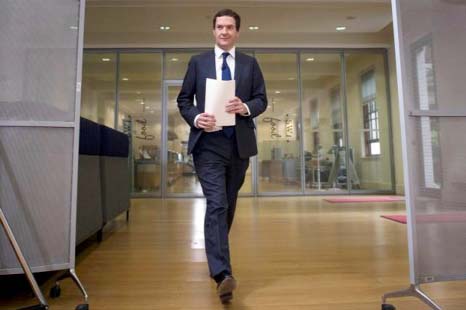
Reuters, London :Britain’s finance minister said on Monday the country’s economy was strong enough to cope with volatility caused by its vote to leave the European Union, whose leaders demanded a quick divorce and promised no special treatment.With financial markets shaken by the shock outcome of Thursday’s referendum, Chinese Premier Li Keqiang said uncertainties over the global economy had heightened and called for a “united, stable EU, and a stable, prosperous Britain”.But British politics are in crisis, with the ruling Conservatives facing a leadership battle and lawmakers in the main opposition party, Labour, trying to topple their leader.On the financial markets, the pound has come under siege and the euro has been struggling since the referendum, in which 52 percent of voters backed a British exit from the EU, or Brexit.Speaking publicly for the first time since the vote, British Chancellor George Osborne said he was working closely with the Bank of England and officials in other leading economies for the sake of stability as Britain reshapes its relationship with the EU.”Our economy is about as strong as it could be to confront the challenge our country now faces,” he told reporters at the Treasury. “It is inevitable after Thursday’s vote that Britain’s economy is going to have to adjust to the new situation we find ourselves in.”Boris Johnson, a leading proponent of a Brexit and likely contender to replace Prime Minister David Cameron who resigned on Friday, praised Osborne for saying “some reassuring things to the markets.” He said outside his home in north London that it was now clear “people’s pensions are safe, the pound is stable, markets are stable. I think that is all very good news.”The vote last Thursday to leave the trading and political bloc Britain joined 43 years ago delivered the biggest blow since World War Two to the European project of forging greater unity.Cameron, who is staying on for three months as a caretaker, refused to notify the EU formally of Britain’s intention to quit, leaving the job to whoever replaces him as Conservative leader and prime minister. The replacement is unlikely to be in office before October, so Britain and the EU are left in a political limbo.Many European leaders want rapid action, and say there is no going back on the vote.”France like Germany says Britain has voted for Brexit. It should be implemented quickly. We cannot remain in an uncertain and indefinite situation,” French finance minister Michel Sapin said on France 2 television.Guenther Oettinger, a German member of the EU’s executive European Commission, also issued a warning.”Every day of uncertainty prevents investors from putting their funds into Britain, and also other European markets,” he told Deutschlandfunk radio. “Cameron and his party will cause damage if they wait until October.”German Chancellor Angela Merkel has taken a softer line. She says she will not battle now over the timeframe and has underlined the need to continue a positive trade relationship with Britain, a big market for German carmakers and other manufacturers.

